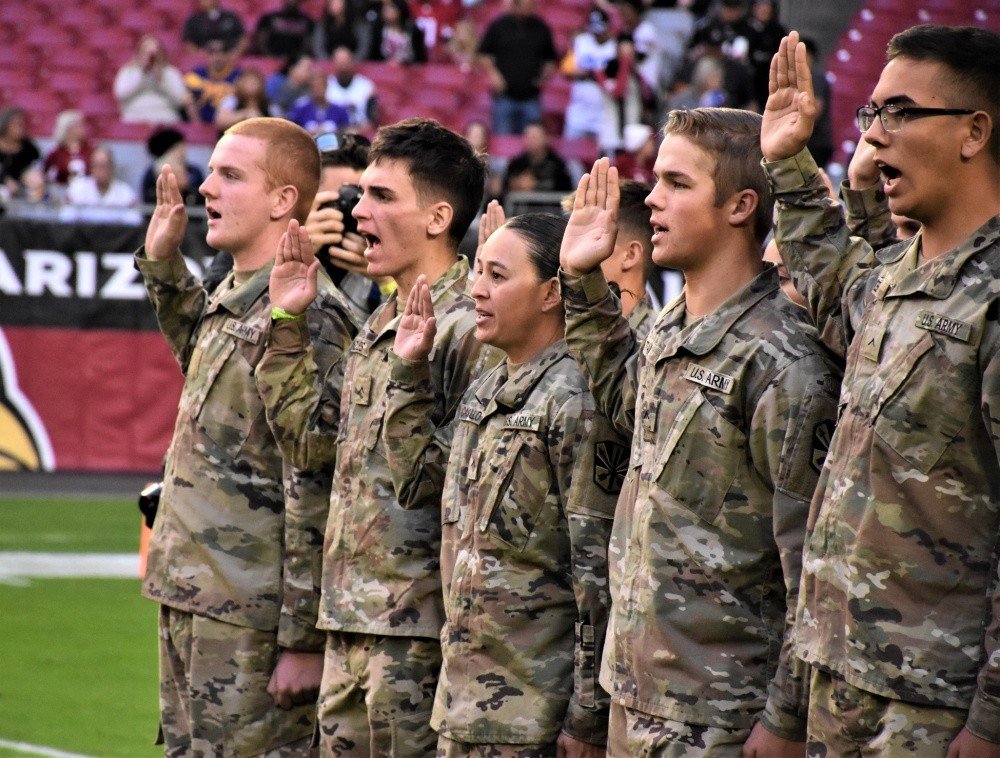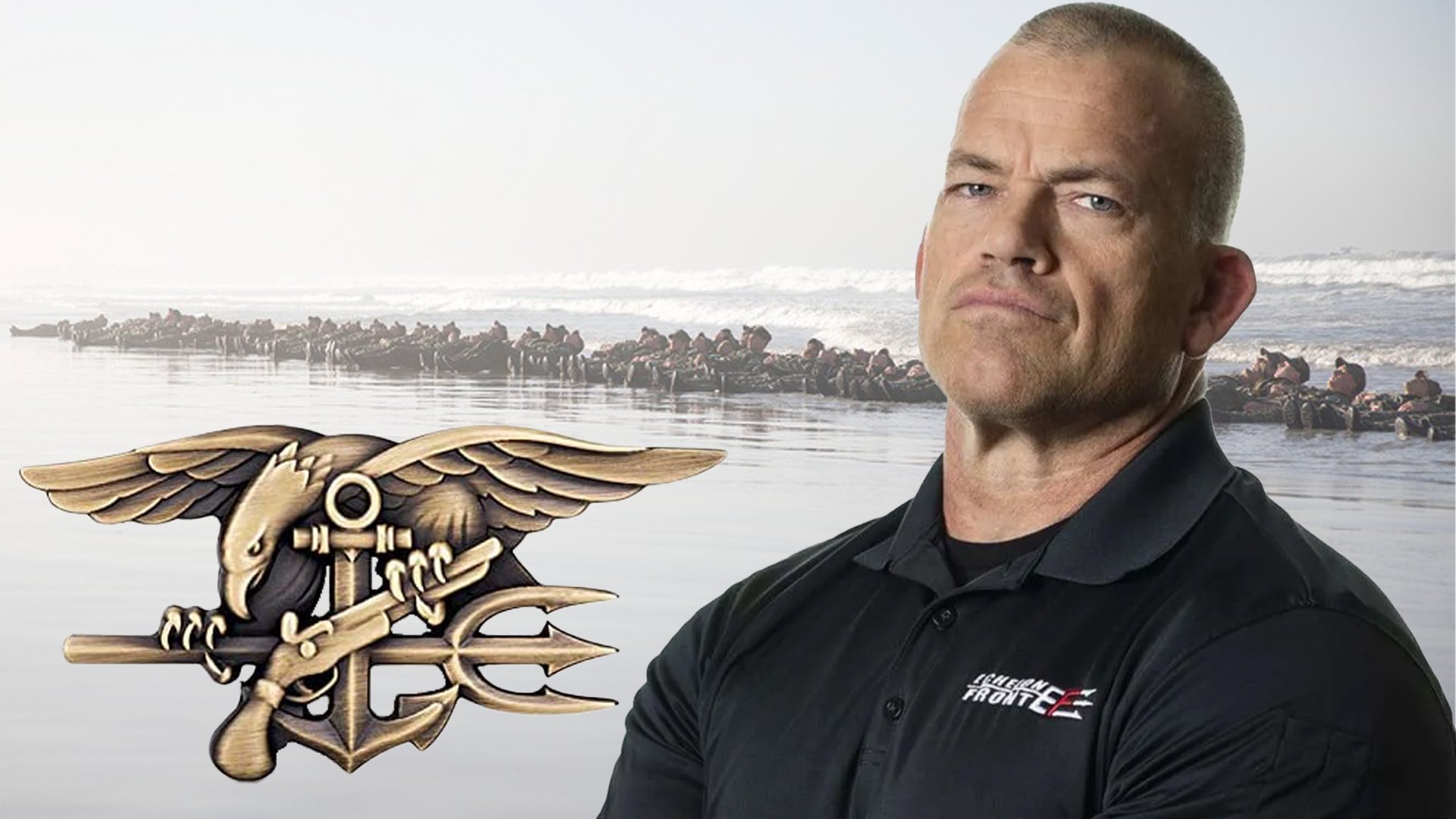New Entrance Test to Increase Soldier Quality, Reduce Attrition

Recruits from the Phoenix Recruiting Battalion, National Guard and Marines, recite the Oath of Enlistment during a mass enlistment ceremony Dec. 1, 2019, at State Farm Stadium, Glendale, Arizona. The ceremony took place shortly before a National Football League football game between the Arizona Cardinals and Los Angeles Rams. Photo by Alun Thomas, courtesy of the U.S. Army.
This article was originally published on Jan. 1, 2020, by the U.S. Army News Service.
WASHINGTON — As part of a Department of Defense pilot program, a new military entrance exam is being administered to Army recruits to predict performance, behaviors, attitudes, and attrition of potential Soldiers. The pilot program is designed to see how the Army can get best-fit recruits.
The three-year pilot study authorized by DoD is for a talent management tool known as the Tailored Adaptive Personality Assessment System, or TAPAS.
The new TAPAS pilot expands on current screening tools, the Armed Forces Qualification Test score, known as the AFQT, high school diploma, and the Occupational Physical Assessment Test, known as OPAT, in an effort to redefine what a potential Soldier will offer to the Army.
The TAPAS pilot aims to identify potential Soldiers who will outperform what their cognitive aptitude score, the AFQT, suggests. Participants must still achieve the required minimum composite score on the Armed Services Vocational Aptitude Battery, known as the ASVAB, to qualify for their desired specialty.
The TAPAS pilot aims to identify potential Soldiers who will outperform what their cognitive aptitude score, the AFQT, suggests.
Using this pilot, up to 6,000 applicants annually from the Army’s three components who score between a 45 and 49 on the AFQT, have a high school diploma, and also score in the top 50 percent on the TAPAS test will be exempt from DoD quality benchmarks. Whereas the potential Soldier is already fully qualified to enlist, this exempt population will be used to assess the effectiveness of TAPAS on new recruit screenings.
In combination with the existing accessions screens, TAPAS will “provide more holistic evaluation of the potential Soldier which can improve the development and retention of the force at the individual Soldier level,” said Tonia Heffner, selection and assignment research unit chief at the Army Research Institute for the Behavioral and Social Sciences.
The 120-question, non-cognitive personality test has actually been administered to recruits in conjunction with other entrance exams, such as the AFQT, since 2009.
While TAPAS is expected to expand the market of eligible recruits, Heffner said it will not compromise Army standards.
“Anyone who enlists must meet standards,” she said. “Those enlisting in this pilot that expands eligibility must still pass the AFQT, the OPAT, pass a drug and alcohol screening test as well as a criminal background check before selecting one of the Army’s occupational specialties.”
“Those who will enlist through the pilot program will be more qualified than what their cognitive test score says. […] This is increasing the overall quality of the Army.”
In the past decade, Heffner and her team have compiled data from enlisted Soldiers using TAPAS. The results have consistently shown that individuals with higher motivation outperform what their AFQT score indicates. They adapt better to the Army, and have fewer disciplinary incidents, Heffner said.
“Those who will enlist through the pilot program will be more qualified than what their cognitive test score says,” Heffner said. “I expect them to perform much higher” than predicted by the AFQT. It’s not just a little bit, it’s noticeably higher than that. There will be lower attrition for the people in the pilot program and they will outperform many of their peers with similar AFQT scores.
“This is increasing the overall quality of the Army,” she added.
Allowing those who score in the top 50% of the TAPAS to enlist will help fill the Army with “high-quality, extremely-fit individuals who are capable of performing successfully as Soldiers,” Heffner said.
The Army has always competed against tough job markets without needing to lower standards, an Army spokesperson noted, adding that the pilot offers more opportunities to qualified Americans willing to serve by taking into account other qualities beyond what a cognitive aptitude exam can identify.

For more articles like this, visit https://www.army.mil/news.
BRCC and Bad Moon Print Press team up for an exclusive, limited-edition T-shirt design!
BRCC partners with Team Room Design for an exclusive T-shirt release!
Thirty Seconds Out has partnered with BRCC for an exclusive shirt design invoking the God of Winter.
Lucas O'Hara of Grizzly Forge has teamed up with BRCC for a badass, exclusive Shirt Club T-shirt design featuring his most popular knife and tiomahawk.
Coffee or Die sits down with one of the graphic designers behind Black Rifle Coffee's signature look and vibe.
Biden will award the Medal of Honor to a Vietnam War Army helicopter pilot who risked his life to save a reconnaissance team from almost certain death.
Ever wonder how much Jack Mandaville would f*ck sh*t up if he went back in time? The American Revolution didn't even see him coming.
A nearly 200-year-old West Point time capsule that at first appeared to yield little more than dust contains hidden treasure, the US Military Academy said.












